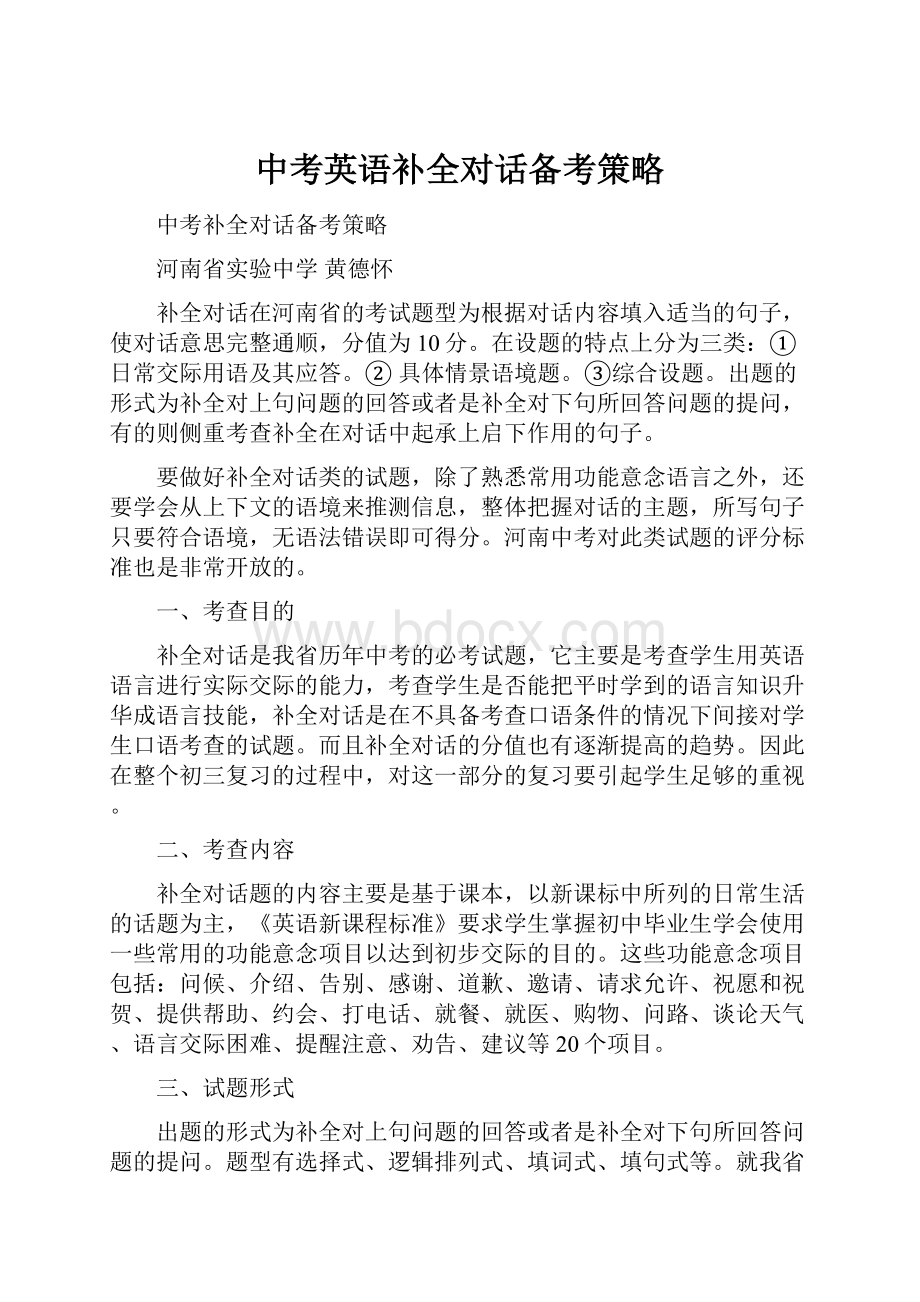中考英语补全对话备考策略.docx
《中考英语补全对话备考策略.docx》由会员分享,可在线阅读,更多相关《中考英语补全对话备考策略.docx(30页珍藏版)》请在冰豆网上搜索。

中考英语补全对话备考策略
中考补全对话备考策略
河南省实验中学黄德怀
补全对话在河南省的考试题型为根据对话内容填入适当的句子,使对话意思完整通顺,分值为10分。
在设题的特点上分为三类:
①日常交际用语及其应答。
②具体情景语境题。
③综合设题。
出题的形式为补全对上句问题的回答或者是补全对下句所回答问题的提问,有的则侧重考查补全在对话中起承上启下作用的句子。
要做好补全对话类的试题,除了熟悉常用功能意念语言之外,还要学会从上下文的语境来推测信息,整体把握对话的主题,所写句子只要符合语境,无语法错误即可得分。
河南中考对此类试题的评分标准也是非常开放的。
一、考查目的
补全对话是我省历年中考的必考试题,它主要是考查学生用英语语言进行实际交际的能力,考查学生是否能把平时学到的语言知识升华成语言技能,补全对话是在不具备考查口语条件的情况下间接对学生口语考查的试题。
而且补全对话的分值也有逐渐提高的趋势。
因此在整个初三复习的过程中,对这一部分的复习要引起学生足够的重视。
二、考查内容
补全对话题的内容主要是基于课本,以新课标中所列的日常生活的话题为主,《英语新课程标准》要求学生掌握初中毕业生学会使用一些常用的功能意念项目以达到初步交际的目的。
这些功能意念项目包括:
问候、介绍、告别、感谢、道歉、邀请、请求允许、祝愿和祝贺、提供帮助、约会、打电话、就餐、就医、购物、问路、谈论天气、语言交际困难、提醒注意、劝告、建议等20个项目。
三、试题形式
出题的形式为补全对上句问题的回答或者是补全对下句所回答问题的提问。
题型有选择式、逻辑排列式、填词式、填句式等。
就我省中考题型而言,补全对话只有一种形式,就是根据上下文语境填写对话中所空出的语句,这就要求学生在平时的学习中,要注意交际语言量的积累,在复习的过程中要侧重应试能力以及应试技巧的培养。
四、解题步骤
1.通读对话,仔细审题
学生应将对话从头至尾通读一遍,并根据对话所给的情景判断出谈话双方的关系,谈话地点,谈话方式,谈话话题内容等基本情况。
从而对症下药,从头脑中提取所需的习惯用语,为顺利地完成此题做好准备。
2.分析对话,试填答案
根据通读整个对话所获得的信息试探性地猜测所需语句。
试填答案时,一要问答一致并根据所学关方面典型句型来试填。
二要注意对话的表达要符合西方人的风俗习惯。
英汉两种语言对日常生活中的同一话题可能会有不同的表达方式。
不同的中西文化差异,要靠我们在平时的学习中注意积累、归纳与总结。
由于东西方的文化差异,当中国学生学英语时,难免有时会用汉语进行思维,这样多少会反映出汉语言特色,说出不地道的英语。
但学习语言,同时也是学习一种文化,我们有必要学习标准的英语表达法,熟记具有文化差异的典型例句。
3.逐字细读,确定答案
要求学生把整个对话重读一遍,检查问答是否一致,对话是不是通顺,流畅,前后句子是不是符合逻辑,是否符合习惯用法。
首字母、标点是不是书写正确。
4.复读整个对话,验证答案
所有空白都填好以后,还不是最后完成,还要验证。
这时同学们要再认真仔细地阅读全文,对所有的答案逐个再做一次复检,细心审查,注意细枝末节,纠正包括大小写、标点、时态、语态及表达法等在内的任何错误,只有耐心细致,才能确保万无一失。
五、复习指导
1.重视课本,梳理知识,熟记表达法。
同学们要收集课文中出现的常用交际用语,对课文和对话中有关的购物、打电话、问路、看病等有关对话要反复练习,因为一些话题在中考试题中经常出现,最好要求学生们能完全背诵下来。
这样就能避免“书到用时方恨少”的遗憾。
虽然试题中的补全对话有变化,但万变不离其中,基本不脱离课文和对话的原形。
在整个初中学习过程中,学生会学习到许多具有语言功能的短句,单独记忆这些短句比较困难。
但如果引导学生对不同的语言功能短句进行归纳和整理,形成不同的知识板快,那么学生在做题过程中就会得心应手了。
因此,复习时可以让学生根据22个交际项目,将日常用语归纳到相应的知识板块,这样学生就会拥有一个完备的知识体系了。
2.归纳总结功能相同的句型:
感谢类:
Thanks!
Thankyou!
Thanksalot!
Thankyouverymuch!
Thankyouvery,verymuch!
答谢类:
That’sallright.没关系.
That’sOK.没关系.
Notatall.不用谢.
Youarewelcome.不必谢.
It’sapleasure.
道歉类:
Sorry.
Iamsorry…
Iamsorryfor…
应答类:
That’sallright.
Itdoesn’tmatter.
That’snothing.
建议类:
Youhadbetter…
Shallwedo…?
Whataboutdoing…?
Howaboutdoing…?
Whynotdo…?
Let’sdosth…OK?
Wouldyoulikesome…?
同意类:
OK.
Sure.
Certainly.
Allright.
Yes,please.
Yes,Ithinkso.
Iagreewithyou.
不同意类:
Iamafraidnot.
Sorry,Idon’tthinkso.
Ireallycan’tagreewithyou.
祝愿祝贺类 GoodLucktoyou!
Bestwishes!
Haveagood(nice)time!
Congratulationstoyou!
HappyTeachers’Day!
Happybirthdaytoyou!
HappyNewYear!
MerryChristmas!
3.熟记“问”字句型
问天气:
What’stheweatherliketoday?
Howistheweathertoday?
问时间:
What’sthetime?
Whattimeisit?
问职业:
What’syourfather?
What’syourfather’sjob?
Whatdoesyourfatherdo?
问价格:
What’sthepriceofthebook?
Howmuchisthebook?
Howmuchdoesthebookcost?
HowmuchshouldIpayforthebook?
问年龄:
Howoldareyou?
What’syourage?
问地址:
Whatdoyoulive?
What’syouraddress?
问姓名:
What’syourname?
CouldIhaveyourname,please?
Doyoumindmyknowingyourname?
DoyoumindifIknowyourname?
Canyoutellmeyourname?
问词意:
Whatdoyoumeanbysayingtheword?
What’sthemeaningoftheword?
Whatdoesthewordmean?
问单位:
Wheredoyouwork?
Whatcompanyareyouworkingfor?
问爱好:
Whichdoyoulikebest?
Whichdoyouprefer?
What’syourhobby?
What’syourfavorite?
问感受:
Whatdoyouthinkofthefilm?
Howdoyoulikethefilm?
问数量:
Howmanypeoplearethereinyourfamily?
Howmuchwaterdoyoudrinkeveryday?
问人口:
What’sthepopulationofChina?
HowmanypeoplearethereinChina?
HowlargeisthepopulationofChina?
问路线:
Whichisthewaytothestation?
Doyouknowthewaytothestation?
Canyoutellmethewaytothestation?
HowcanIgettothestation?
问尺寸:
Whatsizeisyoursweater?
Whatsizedoyouwant?
Whatsizedoyouneed?
问距离:
Howfarisyourschoolfromhere?
Howfarawayisyourschoolfromhere?
问日期:
What’sthedatetoday?
问星期:
Whatdayisittoday?
问高度:
Howtallareyou?
What’syourheight?
Howhighisthemountain?
问宽度:
Howwideistheriver?
问长度:
Howlongisthebridge?
问体重:
What’syourweight?
Howmuchdoyouweigh?
问电话:
CanIknowyourtelephonenumber?
What’syourtelephonenumber?
4.巧练多思,熟能生巧。
在巩固练习阶段,学生可以遵循由浅入深的认知规律,先练简单的再练复杂的,并在做题中运用做题技巧,巩固基础知识,达到不断提高的目的。
在平时的学习过程中学生要反复朗读,对重点句型要熟记在心。
然后再通过大量的练习加以巩固,这样就为做好本题做好了知识铺垫。
但不要只简单背诵所学句式,而是应该灵活运用所学句型来解决实际问题。
同时还要注意,要想掌握一种语言,在缺乏必要的语言环境的条件下,实在没有什么捷径可走。
概括起来,只有四个字:
下苦功夫。
俗话说“熟能生巧”,“熟练”是与人会话的前提,只有熟练,在会话时才能流利。
熟练的标准就是要达到不假思索地脱口而出。
要想取得好成绩必须能够做到这一点。
六、试题案例
(一)看病
A:
Goodmorning.
B:
Goodmorning.What’swrongwithyou?
A:
Idon’tfeelverywellandI’veaheadache.
B:
Howlonghaveyoubeenlikethis?
A:
Eversincethismorning.
B:
Maybeyou’vecaughtacold.Haveyoutakenyourtemperature?
A:
No,Ihaven’t.
B:
CanItakeyourtemperature?
A:
OK.
B:
Oh,you’vegotafever.
A:
Isitserious?
B:
Nothingserious.
A:
WhatshouldIdothen?
B:
Youcantakesomemedicineanddrinkmuchwater.
A:
HowoftenshouldItakethismedicine?
B:
Youcantakethismedicinethreetimesadayandyou’llbeallrightsoon.
A:
Thankyou,doctor.I’lldoasyousay.Bye!
B:
Bye!
(二)打电话
J-JimM-MrsRead
J:
Hello.CouldIspeaktoAnn,please?
M:
Certainly.Holdon,please.Oh,I’mafraid.Sheisn’thererightnow.
J:
CanIleaveamessageforher?
M:
Yes,please.Butwhoisthat?
J:
ThisisJimspeaking.
M:
Hello,Jim.CanItakeamessageforyou?
J:
Yes.Couldyouaskhertocallme?
M:
Sure!
What’syourtelephonenumber?
J:
Mytelephonenumberis1234567.
M:
I’llgivethemessagetoherassoonasshecomesback.
J:
Thankyou.Good-bye!
M:
Bye!
(三)购物
A:
Goodmorning.CanIhelpyou?
B:
Yes,please.Iwanttobuyapairofshoes.Canyoushowmeone?
A:
Whatsizedoyouneed?
B:
Size38.
A:
Howaboutthoseones?
B:
Idon’tlikethiscolor.Haveyougotanyothercolors?
A:
Yes.Howaboutthisone?
B:
Itlooksnice.CanItrythemon?
A:
Sure.
B:
Oh,it’sjustright.Whereisitmade?
A:
It’smadeinJapan.It’sverycomfortable.
B:
Howmucharethey?
A:
100yuan.
B:
It’stooexpensive.Ican’taffordit.Haveyougotacheaperone?
A:
Well.I’mafraidit’sthecheapestone.
B:
OK.I’lltakeit.Hereisthemoney.
A:
Thankyou.Good-bye!
B:
Bye!
(四)问路
A:
Excuseme.Whereisthenearestpostoffice,please?
B:
Sorry,Idon’tknow.You’dbetteraskthepolicemanoverthere.Hemayknow.
A:
Thankyouallthesame.
B:
Excuseme.Whichisthewaytothepostoffice,please?
C:
Godownthisstreetandtakethefirstturningontheright.Goacrossthebridgeandyou’llfindthepostofficeontheleft.It’sbetweenthecitylibraryandthehospital.Youcan’tmissit.
A:
Howfarisitfromhere?
C:
It’sabout30minutes’walk.You’dbettercatchabus.
A:
WhichbusdoIneed?
C:
Ithinkyouneedanumber16bus.Thebuswilltakeyouthere.
A:
Thankyouverymuch.
C:
You’rewelcome.
(五)约定
A:
WhatareyougoingtodonextSunday?
B:
Nothingmuch(Nothingspecial).
A:
Shallwegototheparkandplayfootball?
B:
Goodidea.
A:
Howcanwegetthere?
B:
Bybike.
A:
Whereshallwemeet?
B:
Howaboutmeetingatthegateofourschool?
A:
Whenshallwemeet?
B:
At8:
30.
A:
Whynotmeetalittleearlier?
Let’smakeithalfpastseven.
B:
OK.
A:
Seeyouthen.
B:
Seeyou.
(六)询问病情
A:
Goodmorning.XiaoXue!
B:
Goodmorning.LinLin!
A:
Idon’tseeZhouTaotoday.Doyouknowwhereheis?
B:
Yes.Heisinhospital.
A:
What’swrongwithhim?
B:
Yesterdayeveninghefeltterrible.Hehadapaininhisteethandhisfathertookhimtothehospital.
A:
Whathappenedtohimthen?
B:
Oneofhisteethisbroken.Thedoctortookitout.
A:
I’msorrytohearthat.Healwayseatsalotofsweets.
B:
Yes.Buthewon’teatthemanymore.
A:
HowisZhouTaofeelingnow?
B:
Idon’tknow.Let’svisithimafterschool.OK?
A:
OK!
(7)聊天
A:
Hello!
Nicetomeetyou
B:
Nicetomeetyou,too
A:
Whatbadweather,isn’tit?
B:
Yes,butIthinkthesunwillcomeoutlateron
A:
MayIaskyousomequestions?
B:
Certainly.
A:
Whereareyoufrom?
B:
I’mfrom…
A:
You’refromAustralia,aren’tyou?
B:
Yes.Howdidyouguess?
A:
Thewayyouspeak.Whenwereyouborn?
B:
IwasbornonAugust8,1988
A:
Wherewereyouborn?
B:
IwasborninasmallvillagenearLondon.
A:
WhydidyoucometoChina?
B:
BecausemyparentswantedtoworkinChina.
A:
HowdoyoulikeChina?
B:
Ilikeitverymuch.
A:
WhatdoyoulikeaboutChina?
B:
Thepeopleandthefood.
A:
HowisyourChinese?
B:
MyChineseisjustso-so.I’mtryingmybesttostudymyChinesewell.
A:
That’sgreat.GoodluckwithyourChinese.
(八)就餐
Waiter:
Goodmorning,madam
AandB:
Goodmorning.
W:
Atablefortwo?
A:
Yes.Canwesitatthetablebythewindow?
W:
OK.Thisway,please.Hereisthemenu.
A:
Thankyou.
W:
MayItakeyourordernow?
A:
Yes,We’llhavechickenwithpotatoes、beef、riceandvegetablesoup.
W:
That’swhatyouordered,pleasetakeyourtime.(Afterthemeal)
A:
Excuseme,Couldwehavesometea,please?
W:
certainly.Wouldyoulikesomethingelse?
A:
No.that’sall.Couldwehavethebill?
W:
Ofcourse.Sir.
A:
Hereisthemoney.
W:
Thankyou.Welcomeyouhereagain.
(九)做客
H-HanMeiT-TwinsL-Lily
H:
Wouldyoulikeadrink?
T:
Yes,please.
H:
I’llgetyousometea.
T:
Canwedoanythingtohelp?
H:
No,thanks.Herearesomecookies.Helpyourselves.
T:
Thankyou.
L:
Well.Ithinkit’stimeforustoleavenow?
H:
Oh,doyouhaveto?
L:
Yes,I’mafraidso.It’sgettinglateandwehavetogetupearlyinthemorning.
H:
Don’tleaveanythingbehind.
L:
Thanks.Ithinkwehaveeverything.Thankyouforhavingus.Weenjoyedourselvesverymuch.
H:
I’mhappyyoudid.Bye!
(十)交通事故
A:
Excuseme.Whathashappened?
B:
Acarhitanelectricpole.
A:
Whendidithappen?
B:
Abouttenminutesago.
A:
Hasanyonecalledthepolice?
B:
Yes,butthepolicehaven’tcome.
A:
Isanyonehurt?
B:
Yes,amanishurt,butnotbadly.